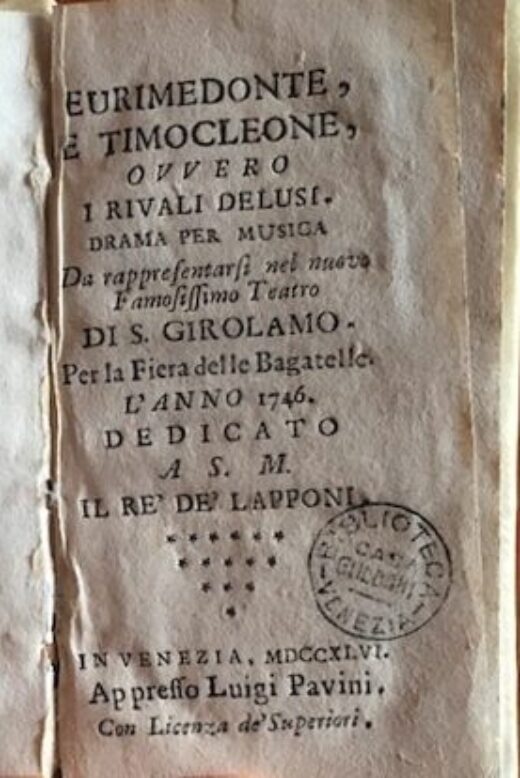
Printed
60 pages
Author(s)
Eurimedonte e Timocleone
ovvero I Rivali delusi
To add to his family's prestige, Angelo Maria Labia had a small stately theatre, the Teatro di San Girolamo, built in his palace on the Cannaregio canal in Venice; this was a miniature version of the Teatro San Giovanni Grisostomo. The theatre showed precious fabrics and materials, and the stages and scenery were moved by very intricate gears and machinery. The musicians, set designers and costume designers were among the most prestigious of the city. Eurimedonte e Timocleone, ovvero I rivali delusi (Eurymedon and Timoelon, or The Disappointed Rivals) was performed during the Fiera delle Bagatelle in 1746, and Labia employed the same staff which had worked on Lo Starnuto d’Ercole the previous year. Zanetti’s libretto was staged with music by Johann Adolf Hasse, also known as the Saxon, the choirmaster for the king of Poland; Natale Canziani, a famous costume designer for regular theatres, made the costumes. Tommaso Cassani created the spectacular scenery. The singers performed behind the stage.
The libretti of the operas staged in Labia’s theatre were printed in in-24 for his guests. Zanetti’s libretto includes the cast and the puppets playing the characters, as though they were human actors, using imaginary names playing with their artificial nature (i.e.: “Antonio Bamboccio” or “Maddalena Statuina”). In the burlesque epistle dedicatory addressed “To the King of the Lapps”, the author insists on the small size of the characters: they are puppets manipulated from above with strings and from below with springs, with such skill that the play features a scene of embarking on ships (II, 6). The performance presents many spectacular sceneries, including, in addition the port which shows a large altar to Jupiter, a sumptuous amphitheatre, a gothic temple, the underground passages of the Avernus and – in the last scene – a private room decorated with many mirrors. The final chorus accompanies an optical illusion created using a magic lantern: the court opens onto the royal gardens, also showing a rainbow; in an avista, the scenery changes into the kingdom of Flora
In the same year, Antonio Gori’s Il Cajetto was staged at the Teatro Labia. The following years, Metastasio’s Didone abbandonata (1747) and Apostolo Zeno’s Gianguir (1748) were also performed there. After this last date, the performances became too costly and stopped.
A princess must choose between two suitors
Ipodamia (Hippodamia), the widow of the Armenian King, begs her daughter Aurinome to choose between her two suitors, Eurimedonte (Eurymedon) and Timocleone (Timoleon), to bring peace to the kingdom. Aurinome puts their love to the test, and they compete using words. Oronte, the general of the army, is secretly in love with Aurinome; Acrone discovers it and tells Ipodamia. The latter is set on stopping him to prevent her daughter from ending up in the hands of an unworthy man, and to spare the kingdom the anger of the princes. During a hunt, Oronte saves Aurinome from the mouth of a lion; he declares his love to her. Aurinome demands that the brave general receive a reward, but Ipodamia and the two suitors downplay his courageous act.
Aurinome fell in love with Oronte. She tells the princes to meet her at the altar of the great Jupiter. As she is late, they hesitate over embarking with their respective armies, but Ipodamia convinces them to stay. Aurinome asks Oronte to arrive before her at the temple: he obeys her, and she asks him to choose one of her suitors.
Oronte does not know what to answer, and he is interrupted by Acrone. Aurinome promises to choose between her suitors before the entire kingdom. As Eurimedonte and Timocleone, standing by the Avernus, are contemplating suicide, Acrone announces that Oronte will soon be dead. Inside a gorgeous room where royal weddings are celebrated, Aurinome asks the princes to promise that they will respect her choice; at this moment, Oronte arrives, armed: he has been saved by partisans and entrusts his fate to the Princess: she pronounces him husband and King.
First performance
Teatro San Girolamo
Publications and translations
Eurimedonte e Timocleone. Venezia: Luigi Pavini, 1746.
